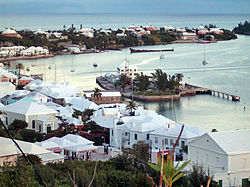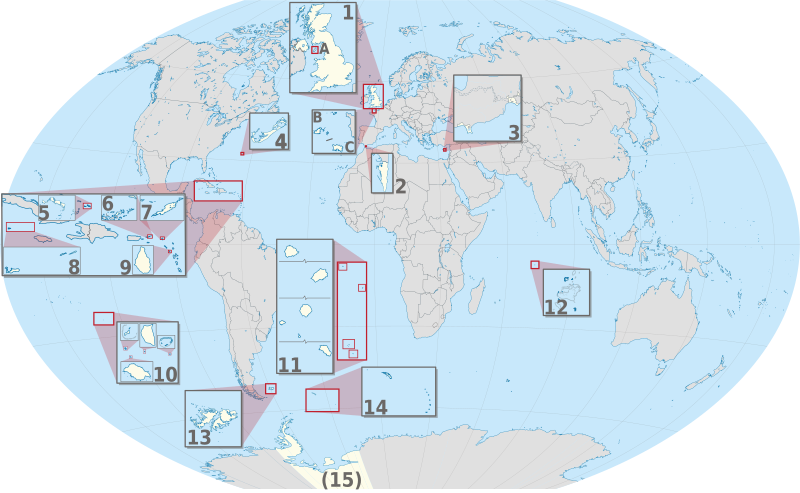Administrative divisions
The geographical division of the United Kingdom into counties or shires began in England and Scotland in the early Middle Ages and was complete throughout Great Britain and Ireland by the early Modern Period.[157] Administrative arrangements were developed separately in each country of the United Kingdom, with origins which often pre-dated the formation of the United Kingdom. Modern local government by elected councils, partly based on the ancient counties, was introduced separately: in England and Wales in a 1888 act, Scotland in a 1889 act and Ireland in a 1898 act, meaning there is no consistent system of administrative or geographic demarcation across the United Kingdom.[158] Until the 19th century there was little change to those arrangements, but there has since been a constant evolution of role and function.[159]
The organisation of local government in England is complex, with the distribution of functions varying according to local arrangements. The upper-tier subdivisions of England are the nine regions, now used primarily for statistical purposes.[160] One region, Greater London, has had a directly elected assembly and mayor since 2000 following popular support for the proposal in a referendum.[161] It was intended that other regions would also be given their own elected regional assemblies, but a proposed assembly in the North East region was rejected by a referendum in 2004.[162] Below the regional tier, some parts of England have county councils and district councils and others have unitary authorities; while London consists of 32 London boroughs and the City of London. Councillors are elected by the first-past-the-post system in single-member wards or by the multi-member plurality system in multi-member wards.[163]
For local government purposes, Scotland is divided into 32 council areas, with wide variation in both size and population. The cities of Glasgow, Edinburgh, Aberdeen and Dundee are separate council areas, as is the Highland Council, which includes a third of Scotland's area but only just over 200,000 people. Local councils are made up of elected councillors, of whom there are 1,223;[164] they are paid a part-time salary. Elections are conducted by single transferable vote in multi-member wards that elect either three or four councillors. Each council elects a Provost, or Convenor, to chair meetings of the council and to act as a figurehead for the area.
Local government in Wales consists of 22 unitary authorities. These include the cities of Cardiff, Swansea and Newport, which are unitary authorities in their own right.[165] Elections are held every four years under the first-past-the-post system.[165]
Local government in Northern Ireland has since 1973 been organised into 26 district councils, each elected by single transferable vote. Their powers are limited to services such as collecting waste, controlling dogs and maintaining parks and cemeteries.[166] In 2008 the executive agreed on proposals to create 11 new councils and replace the present system.[167]
Dependencies
The United Kingdom has sovereignty over seventeen territories which do not form part of the United Kingdom itself: fourteen British Overseas Territories[25] and three Crown dependencies.[25][168]
The fourteen British Overseas Territories are: Anguilla; Bermuda; the British Antarctic Territory; the British Indian Ocean Territory; the British Virgin Islands; the Cayman Islands; the Falkland Islands; Gibraltar; Montserrat; Saint Helena, Ascension and Tristan da Cunha; the Turks and Caicos Islands; the Pitcairn Islands; South Georgia and the South Sandwich Islands; and Akrotiri and Dhekelia on the island of Cyprus.[169] British claims in Antarctica are not universally recognised, mainly by Argentina, whose claims cover a majority of the British sector.[170] Collectively Britain's overseas territories encompass an approximate land area of 1,727,570 square kilometres (667,018 sq mi) and a population of approximately 260,000 people.[171]
They are the last remaining remnants of the British Empire and a 1999 UK government white paper stated that: "[The] Overseas Territories are British for as long as they wish to remain British. Britain has willingly granted independence where it has been requested; and we will continue to do so where this is an option."[172] Self-determination is also enshrined into the constitutions of several overseas territories and three have specifically voted to remain under British sovereignty (Bermuda in 1995,[173] Gibraltar in 2002[174] and the Falkland Islands in 2013).[175]
The Crown dependencies are possessions of the Crown, as opposed to overseas territories of the UK.[176] They comprise three independently administered jurisdictions: the Channel Islands of Jersey and Guernsey in the English Channel, and the Isle of Man in the Irish Sea. By mutual agreement, the British Government manages the islands' foreign affairs and defence and the UK Parliament has the authority to legislate on their behalf. Internationally, they are regarded as "territories for which the United Kingdom is responsible".[177] The power to pass legislation affecting the islands ultimately rests with their own respective legislative assemblies, with the assent of the Crown (Privy Council or, in the case of the Isle of Man, in certain circumstances the Lieutenant-Governor).[178] Since 2005 each Crown dependency has had a Chief Minister as its head of government.[179]
The British dependencies use a varied assortment of currencies. These include the British pound, US dollar, New Zealand dollar, euro or their own currencies, which may be pegged to either.[citation needed]
Politics
The United Kingdom is a unitary state under a constitutional monarchy. Queen Elizabeth II is the monarch and head of state of the UK, as well as fifteen other independent countries. These sixteen countries are sometimes referred to as "Commonwealth realms". The monarch has "the right to be consulted, the right to encourage, and the right to warn".[180] The Constitution of the United Kingdom is uncodified and consists mostly of a collection of disparate written sources, including statutes, judge-made case law and international treaties, together with constitutional conventions.[181] As there is no technical difference between ordinary statutes and "constitutional law", the UK Parliament can perform "constitutional reform" simply by passing Acts of Parliament, and thus has the political power to change or abolish almost any written or unwritten element of the constitution. No Parliament can pass laws that future Parliaments cannot change.[182]
Government
The UK has a parliamentary government based on the Westminster system that has been emulated around the world: a legacy of the British Empire. The parliament of the United Kingdom meets in the Palace of Westminster and has two houses: an elected House of Commons and an appointed House of Lords. All bills passed are given Royal Assent before becoming law.
The position of prime minister,[note 14] the UK's head of government,[183] belongs to the person most likely to command the confidence of the House of Commons; this individual is typically the leader of the political party or coalition of parties that holds the largest number of seats in that chamber. The prime minister chooses a cabinet and its members are formally appointed by the monarch to form Her Majesty's Government. By convention, the monarch respects the prime minister's decisions of government.[184]
The cabinet is traditionally drawn from members of the prime minister's party or coalition and mostly from the House of Commons but always from both legislative houses, the cabinet being responsible to both. Executive power is exercised by the prime minister and cabinet, all of whom are sworn into the Privy Council of the United Kingdom, and become Ministers of the Crown. The current Prime Minister is Boris Johnson, who has been in office since 24 July 2019. Johnson is also the leader of the Conservative Party. For elections to the House of Commons, the UK is divided into 650 constituencies,[185] each electing a single member of parliament (MP) by simple plurality. General elections are called by the monarch when the prime minister so advises. Prior to the Fixed-term Parliaments Act 2011, the Parliament Acts 1911 and 1949 required that a new election must be called no later than five years after the previous general election.[186]
The Conservative Party, the Labour Party and the Liberal Democrats (formerly as the Liberal Party) have, in modern times, been considered the UK's three major political parties,[187] representing the British traditions of conservatism, socialism and liberalism, respectively, though[188] the Scottish National Party has been the third-largest party by number of seats won, ahead of the Liberal Democrats, in all three elections that have taken place since the 2014 Scottish independence referendum. Most of the remaining seats were won by parties that contest elections only in one part of the UK: Plaid Cymru (Wales only); and the Democratic Unionist Party and Sinn Féin (Northern Ireland only[note 15]). In accordance with party policy, no elected Sinn Féin members of parliament have ever attended the House of Commons to speak on behalf of their constituents because of the requirement to take an oath of allegiance to the monarch.[189]
Devolved administrations
Scotland, Wales and Northern Ireland each have their own government or executive, led by a First Minister (or, in the case of Northern Ireland, a diarchal First Minister and deputy First Minister), and a devolved unicameral legislature. England, the largest country of the United Kingdom, has no such devolved executive or legislature and is administered and legislated for directly by the UK's government and parliament on all issues. This situation has given rise to the so-called West Lothian question, which concerns the fact that members of parliament from Scotland, Wales and Northern Ireland can vote, sometimes decisively,[190] on matters that affect only England.[191] The 2013 McKay Commission on this recommended that laws affecting only England should need support from a majority of English members of parliament.[192]
The Scottish Government and Parliament have wide-ranging powers over any matter that has not been specifically reserved to the UK Parliament, including education, healthcare, Scots law and local government.[193] In 2012, the UK and Scottish governments signed the Edinburgh Agreement setting out the terms for a referendum on Scottish independence in 2014, which was defeated 55.3 per cent to 44.7 per cent – resulting in Scotland remaining a devolved part of the United Kingdom.[194]
The Welsh Government and the National Assembly for Wales have more limited powers than those devolved to Scotland.[195] The Assembly is able to legislate on devolved matters through Acts of the Assembly, which require no prior consent from Westminster.
The Northern Ireland Executive and Assembly have powers similar to those devolved to Scotland. The Executive is led by a diarchy representing unionist and nationalist members of the Assembly.[196] Devolution to Northern Ireland is contingent on participation by the Northern Ireland administration in the North-South Ministerial Council, where the Northern Ireland Executive cooperates and develops joint and shared policies with the Government of Ireland. The British and Irish governments co-operate on non-devolved matters affecting Northern Ireland through the British–Irish Intergovernmental Conference, which assumes the responsibilities of the Northern Ireland administration in the event of its non-operation.
The UK does not have a codified constitution and constitutional matters are not among the powers devolved to Scotland, Wales or Northern Ireland. Under the doctrine of parliamentary sovereignty, the UK Parliament could, in theory, therefore, abolish the Scottish Parliament, Welsh Assembly or Northern Ireland Assembly.[197][198] Indeed, in 1972, the UK Parliament unilaterally prorogued the Parliament of Northern Ireland, setting a precedent relevant to contemporary devolved institutions.[199] In practice, it would be politically difficult for the UK Parliament to abolish devolution to the Scottish Parliament and the Welsh Assembly, given the political entrenchment created by referendum decisions.[200] The political constraints placed upon the UK Parliament's power to interfere with devolution in Northern Ireland are even greater than in relation to Scotland and Wales, given that devolution in Northern Ireland rests upon an international agreement with the Government of Ireland.[201]







No comments:
Post a Comment